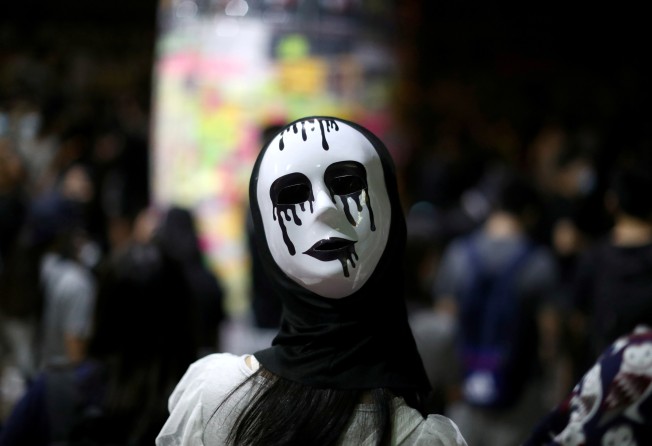The violence won’t end if Hongkongers would prefer to take their chances with the mob rather than side with Carrie Lam
- Many people understand the rage of the protesters, even if they don’t support the violence. Such empathy is further coloured by mistrust of the Carrie Lam administration. The government must take positive action to realign public opinion

On Saturday, Chief Executive Carrie Lam Yuet-ngor, flanked by 14 wooden-faced officials, condemned the violence and destruction during what she described as a “very dark night”. In an episode of savage protest the night before, mobs had smashed, clubbed and burned their way across the city. The violence occurred after the government brought emergency regulations into effect in order to ban face masks.
Violence is now a constant in the Hong Kong protests. Mass demonstrations, once peaceful, used to feature protesters apologising when things got out of hand. Such quaint acts of contrition are now a thing of the past.
In her address to the people on Saturday, Lam urged Hongkongers to “condemn violence together and resolutely disassociate with rioters”. Yet public tolerance for the violence and destruction seems to persist. The police are heckled by bystanders as they arrest protesters and groups organise themselves to protect them.
Lam’s entreaty to the people of Hong Kong to condemn their fellow citizens puts them on the horns of a dilemma. Few openly condone violent protest, but many have empathy for the fundamental plight of the protesters. And few trust that the government will act in the interests of the people.
Even for those who wish to denounce the violence, condemnation of riot action would require that they appear to side with the government. It is a prospect few seem ready to stomach.
This dilemma arises in part because many people in Hong Kong understand the rage of the protesters, even if they don’t support the violence. They are also enraged. People understand when young protesters say they are rising against the hopelessness of their future. They understand these bleak prospects because of their own lived reality.
This empathy has led some to conclude that violence is an inevitable, perhaps necessary, reaction to Hong Kong’s deep social dissatisfactions. In the face of an intransigent government, how else are people to get attention?
A survey in late August by the Chinese University of Hong Kong shed some light on this sentiment. When asked if they agree that radical action is the only way of making the government respond to people’s demands, 26.9 per cent of respondents agreed and 36.1 per cent were on the fence. Only 35.1 per cent said no.
Frustration at official insensitivity have not been helped by the government’s positioning of the police force. The police, an organisation purposely built to convey a physical threat, has been set up as the government’s proxy for interactions with citizens. It is no surprise that violence erupts when heavily armed officers encounter frustrated elements of the public.
Empathy with the rioters is further coloured by widespread mistrust and lack of confidence in Lam and her government. A poll in mid-August by the Hong Kong Public Opinion Research Institute found that only 27 per cent of respondents expressed trust in the government, a record low. Seventy-six per cent of the people polled indicated they had no confidence in Lam. It is unlikely that these figures have improved in recent weeks.
If there is virtually no trust in the government, how then are Hongkongers to feel comfortable agreeing with anything top officials say? The social contract, where subjects agree to be governed in return for safety and security, requires trust. Trust has been so badly eroded that many people would seem prepared to take their chances with the mob rather than with their government.
To rebuild trust, and encourage more people to get on board with the government, action that aligns with the will of the people is needed. Neither the enactment of emergency powers, nor the government’s silence, builds trust. The withdrawal of the reviled extradition bill that set this crisis off does not count, nor do apologies and vague promises to listen and do better.
The government professes to now have a better sense of public sentiment. Perhaps. Secretary of Security John Lee Ka-chiu, commenting on the violence last week, said: “What is adding oil to violence is people’s support for these acts or people’s acquiescence in finding reasons for this violence to continue.”
On that at least, Lee sounds like he’s read it right. The government now needs to give the people of Hong Kong a reason to support an alternative to violence.
Robin Hibberd was an executive vice-president with a large Canadian-based international bank until 2015 and was responsible for its businesses in Hong Kong and China and the Asian region. He has lived in Hong Kong since 1993 and is a former president of the Canadian Chamber of Commerce in Hong Kong